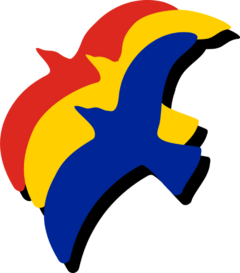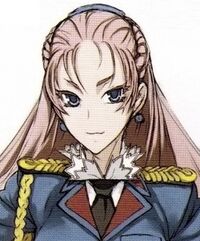National Union (Akashi)
National Union 全国同盟 𐌰𐌻𐌰𐌸𐌹𐌿𐌳𐍉 𐌰𐌹𐌽𐌰𐌼𐌿𐌽𐌳𐌹𐌸𐌰 𐌳𐌰𐌹𐌻ᚴ𐌾𐍉 | |
|---|---|
 | |
| Abbreviation | NU |
| Founded | 1940 |
| Preceded by | National Renewal Movement |
| Ideology | Yurikarism |
| Political position | Centre-left to Centre |
| National affiliation | Pale crimson bloc Historical: Light yellow bloc (1940–1972) |
| Colours | Teal |
| MNAs | 16 / 400 |
The National Union (Miranian: 全国同盟 Zenkoku dōmei; Gothic: 𐌰𐌻𐌰𐌸𐌹𐌿𐌳𐍉 𐌰𐌹𐌽𐌰𐌼𐌿𐌽𐌳𐌹𐌸𐌰 𐌳𐌰𐌹𐌻ᚴ𐌾𐍉 Alaþiudō Ainamundiþa Dailkjō) is a Yurikarist political party in Akashi.
Founded in 1940 by Yurika Ehara, the party dominated Akashian politics for 30 years, leaving a permanent mark on the political landscape. It has since declined to a minor party status, continuing to uphold Yurikarist ideals within the pale crimson bloc.
History
Birth into power
The National Union was founded by Yurika Ehara in 1940, by transforming her National Renewal Movement into a political party. On the heels of her victory in the Akashian Civil War, the new party enjoyed a dominant status from the beginning, winning majorities or pluralities in the first Constituent Assembly election, presidential election, provincial election, and prefectural election. In the 1942 general election, it won over 50% of votes and a single-party majority, a feat it would repeat at the next 7 elections.
For almost 3 decades, the NU was the unquestioned dominant party of Akashi. It appealed to voters by embodying modernisation — particularly through the contemporary economic boom — and stability — a hard-won quality after the civil war. Yurikara's advisor Kozue Hidaka took a central role in party organisation, and turned it into a formidable political machine, while managing to forge a relatively coherent ideology of state-driven development and integral nationalism out of Yurikara's actions in office.
The NU's dominance in the National Assembly was backed by a solid centrist bloc of the National Cooperative Party and Agrarian Party. The party was so successful at occupying the centre ground in part due to the civil war, which left the left-wing exhausted and the right-wing disgraced from its alliance with the Futurist Political Party. It also took advantage of the koenkai system, which developed initially from other parties seeking a way to strengthen themselves outside of the legislature.
Challenges
Above all, the NU remained wedded to Yurikara and her personalised style of leadership. Yurikara treated it as more of a way to mobilise support, and neglected to develop a party apparatus. This put it at an increasing disadvantage compared to the opposition.
Despite its aura of invincibility, the NU's dominance first began to erode locally. The 1960 provincial elections were a watershed: it was relegated to opposition in all provinces. The formation of the United Opposition in 1962, although unsuccessful, was another sign of growing discontent.
The public grew tired of the party's long tenure in office, especially as the long economic boom receded. Increasing concern with quality of life issues failed to be addressed due to Yurikara's preoccupation with national "grandeur".
Decline
The NU received a near-deathblow from the Summer of Freedom. The country seemed on the verge of revolution or civil war, and the party's support plunged into the single digits in the 1968 provincial elections and 1969 prefectural elections. Despite controversy, Yurikara's tactic of letting the crisis fade away by itself was vindicated. She formed a national unity government with all parliamentary parties and introduced a series of reforms to "open up the system", which were approved by voters in a June 1969 referendum.
The party won a brief respite in 1970: Yurikara won the presidential election against a "youth revolution" candidate, and Masaki Ōshiro led the party to its last majority in the general election. The trends were ominous: the NU's PR vote nearly halved, and it was only saved by winning a majority of the single transferable vote in constituencies. At this juncture, the party needed a leader of Yurikara's stature, which the low-key Masaki was not.
The Summer of Freedom had caused a public fracture in the party, with the appearance of a "right-wing" faction that had called for tougher measures against the protesters, and leaned conservative. Masaki was part of the "left-wing" faction; to shore up his government, he formed a coalition with the Socialist Party and National Cooperative Party. This began the NU's move from the centre to the centre-left.
The government was torn by the "siege economy", the SP seizing its coalition role to push the government left, and the growing public view of Masaki as an ineffective and dithering leader. The loss of a budget vote in 1972 caused a snap election, which ended the NU's period as a major party: it fell to only 17 seats, one of the worst defeats for a ruling party in Eracura. Ironically, the defeat helped restore party unity: the "right-wing" faction was destroyed and the "left-wing" faction left firmly in control.
Minor party
The NU remained part of the left-wing governments of the 1970s. The last remnant of its ruling years was Yurikara as president; she narrowly won re-election in 1975 and ultimately lost in 1980 during another period of economic crisis and political impasse.
During the severely divided 12th Assembly, president Masako Nakai at one point asked party leader Mutsuhito Ōe to form a government. His two proposals were a grand coalition of the centre-left, centre, and centre-right, or an NU government tolerated by the centre-left and centre-right until the next elections. Neither proposal managed to win a majority in the National Assembly, and thus he resigned. His interim term makes him the last NU prime minister.
The 1980s found the NU in opposition, and after another brief dalliance with the centre under Mutsuhito, it consolidated its cooperation with the Socialist Party.
The "red wave" of 1990 brought the NU out of opposition, as it provided outside support to Shinobu Furukawa's Communist Party-led coalition, which lasted until 2000.
The party reached its lowest ebb in the Assembly in the late 2000s, being reduced to only 5 seats in 2006's "blue wave". The "red wave" of 2010 only repeated the performance, as the SP's single-party majority came at the expense of smaller parties.
The NU provided outside support for Kōko Kaga's first government, and after the SP lost its majority in 2014, it joined Kōko's coalition. It remained in Mizuki Kōhara's coalition after 2022, the first time since 1968 that it participated in a coalition without the SP.
Platform

The NU is a Yurikarist party, whose ideology derives from the thought and actions of Yurika Ehara. Key tenets of its platform include state-driven economic development, civic nationalism, and social liberalism.
Statism is a strong element within the party, and particularly so in economic matters, where it advocates economic interventionism and dirigisme. Although the party is hostile to big business, it has never fully embraced socialism, instead preferring social corporatism. It has been described as economically nationalist.
Although the NU advocates civic nationalism, it has been criticised for excessively emphasising the traditional Miranian–Gothic of identity of Akashi and neglecting the multiculturalism of contemporary Akashi.
Initially, the party was centrist under Yurikara, and historically part of the light yellow bloc. However, over time it trended towards the centre-left, and cemented a disdainful stance towards conservatism. Since the 1970s, the NU has been part of the pale crimson bloc and an ally of the Socialist Party.
Election results
National Assembly
| Election | Party list | Constituency | Seats | +/– | Status | ||
|---|---|---|---|---|---|---|---|
| PR votes | % | STV votes | % | ||||
| 1940 | 786.114 | 47,9% | 60 / 245
|
Government | |||
| 1942 | 887.602 | 50,4% | 106 / 200
|
Government | |||
| 1946 | 1.069.164 | 51,0% | 107 / 200
|
Government | |||
| 1950 | 1.229.653 | 51,5% | 108 / 200
|
Government | |||
| 1954 | 1.497.693 | 51,7% | 109 / 200
|
Government | |||
| 1958 | 1.665.638 | 50,7% | 107 / 200
|
Government | |||
| 1962 | 1.906.725 | 50,5% | 104 / 200
|
Government | |||
| 1966 | 2.061.664 | 50,3% | 110 / 200
|
Government (1966–1968) | |||
| Coalition (1968–1970) | |||||||
| 1970 | 1.364.704 | 28,5% | 2.420.884 | 50,5% | 101 / 200
|
Coalition | |
| 1972 | 350.405 | 7,0% | 449.510 | 9,0% | 17 / 200
|
Coalition | |
| 1974 | 361.513 | 7,0% | 380.877 | 7,4% | 15 / 200
|
Coalition | |
| 1978 | 354.438 | 6,4% | 350.459 | 6,3% | 14 / 200
|
Coalition | |
| 1980 | 389.273 | 6,9% | 270.200 | 4,8% | 14 / 200
|
Interim | |
| 1982 | 288.400 | 5,0% | 155.397 | 2,7% | 17 / 400
|
Opposition | |
| 1986 | 178.496 | 3,0% | 107.216 | 1,8% | 10 / 400
|
Opposition | |
| 1990 | 233.161 | 3,7% | 201.432 | 3,2% | 10 / 400
|
Outside support | |
| 1994 | 256.283 | 4,0% | 267.890 | 4,2% | 11 / 400
|
Outside support | |
| 1998 | 362.522 | 5,5% | 369.155 | 5,6% | 16 / 400
|
Outside support | |
| 1999 | 316.321 | 5,0% | 271.389 | 4,3% | 14 / 400
|
Opposition | |
| 2002 | 314.052 | 4,7% | 334.215 | 5,0% | 15 / 400
|
Opposition | |
| 2006 | 148.020 | 2,2% | 168.004 | 2,5% | 5 / 400
|
Opposition | |
| 2010 | 136.320 | 1,8% | 151.803 | 2,0% | 5 / 400
|
Outside support | |
| 2014 | 534.331 | 6,8% | 464.065 | 5,9% | 17 / 400
|
Coalition | |
| 2018 | 571.184 | 7,2% | 523.221 | 6,6% | 18 / 400
|
Coalition | |
| 2022 | 557.010 | 7,0% | 510.471 | 6,4% | 16 / 400
|
Coalition | |
Presidency
| Election | Candidate | First round | Second round | Result | ||
|---|---|---|---|---|---|---|
| Votes | % | Votes | % | |||
| 1940 | Yurika Ehara | 957.738 | 58,5% | Won | ||
| 1945 | Yurika Ehara | 1.108.072 | 59,0% | Won | ||
| 1950 | Yurika Ehara | 1.376.062 | 57,7% | Won | ||
| 1955 | Yurika Ehara | 1.666.744 | 57,3% | Won | ||
| 1960 | Yurika Ehara | 2.005.521 | 56,6% | Won | ||
| 1965 | Yurika Ehara | 2.337.917 | 58,9% | Won | ||
| 1970 | Yurika Ehara | 2.639.572 | 55,0% | Won | ||
| 1975 | Yurika Ehara | 2.396.660 | 45,9% | 2.478.373 | 50,2% | Won |
| 1980 | Yurika Ehara | 1.423.267 | 25,2% | 2.150.945 | 39,3% | Lost |
| 1985 | No candidate | |||||
| 1990 | No candidate | |||||
| 1995 | No candidate | |||||
| 2000 | No candidate | |||||
| 2005 | Mokichi Sasagawa | 477.944 | 7,4% | Lost | ||
| 2010 | Shirō Kasai | 476.063 | 6,3% | Lost | ||
| 2015 | No candidate | |||||
| 2020 | No candidate | |||||